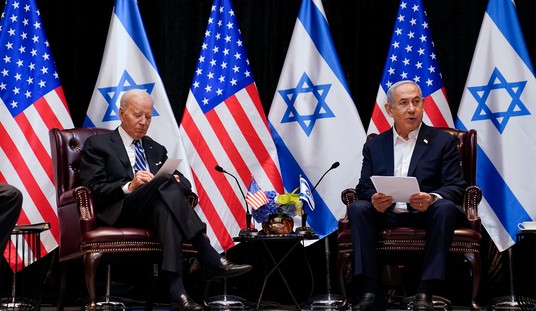I studied fascism primarily because I wanted–desperately–to understand how so many people could have appeased it. Did they–and by “they” I mean the European victims of the Holocaust and the European and American targets of the Axis–not see the evil? Did they not hear the words of the tyrants who constantly called for the destruction of the Western democracies, the enslavement of the inferior races, and the imposition of a new order? Did they not see the armies on the march, the concentration camps being built, and the ruthless campaigns against the racially unworthy, from the Jews to the gays, the gypsies and the mentally challenged?
Why did it take Pearl Harbor to bomb us into action? Why did the Soviet and European Communists–intended victims of Nazism–make a Grand Bargain with the Fuhrer? Why did the Jews, with rare exceptions, go quietly onto the cattle cars?
Nearly fifty years later, I think I understand at least part of it, and, alas, that understanding applies to the current appeasers as well. You’ll find it discussed at length in my forthcoming book, Accomplice to Evil, which identifies many sources of the willful blindness that has long been a central part of the foreign policies of the Western democracies. The three most important factors seem to me to be:
–the Enlightenment theory of human nature, according to which “we are all the same, and we are all basically good”;
–Baudelaire’s profound insight, most recently presented in the great movie “The Usual Suspects”: “the greatest trick the devil ever played on mankind was to convince us that he does not exist”;
–the terrible costs and risk of failure if we recognize our evil enemies for what they are, and defend ourselves against them. Politicians don’t like that; they’d rather leave it to their successors.
If you look at some of the recent commentary on Iran, some of it from very serious, knowledgeable and experienced policy makers, you will find the willful denial of evil in full bloom. Take, for example, the astonishing essay by Francis Fukuyama in the Wall Street Journal last Tuesday, in which he describes Iran in these terms:
A real tyranny would never permit elections in the first place–North Korea never does–nor would it allow demonstrations contesting the election results to spiral out of control…
Following which he opines on how gradual Constitutional change might produce “a genuine rule of law democracy within the broad parameters of the 1979 constitution,” but concludes it is unlikely, and that the most likely outcome of the present internal conflict is “conflict with other countries in the region. This could easily consolidate its legitimacy and power.”
How quickly we forget Comrade Stalin, a “real tyrant” who staged many elections, or Saddam Hussein, who was triumphantly reelected with 99% of the popular vote in Iraq after Gulf War I, or for that matter the Fuhrer himself, who did very well at the polls.
Are we really expected to believe that the evil torturers and terrorists who compose the elite of the Iranian Islamic Republic pay close attention to the letter of the constitution? Its importance lies primarily in transferring all meaningful power to men with turbans, theocratic tyrants who have been waging war against the Iranian people, and against the infidels (most importantly, us and the Israelis) ever since 1979. But Fukuyama has nothing to say about this war, nor the many Americans who have been murdered by the mullahs’ terrorists and soldiers.
He is at one with the deep thinkers around President Obama. Although it is painful, everyone should read the long essay by Roger Cohen, in last Sunday’s New York Times Magazine.
Cohen interviewed the whole Iran policy crowd, headed by Dennis Ross, whose penchant for negotiating with anyone and everyone has been welcomed by presidents of various party and ideological convictions. He just wants to make a deal, and Cohen puts it very clearly:
Ray Takeyh, an Iranian-born adviser to Dennis Ross, the veteran Mideast negotiator who has been working on Iran for the Obama administration, told me before the election. “We’re trying to deal with Iran as an entity, a state, rather than privileging one faction or another. We want to inject a degree of rationality into this relationship, reduce it to two nations with some differences and some common interests — get beyond the incendiary rhetoric.” Takeyh’s words reminded me of Ross, who in his book “Statecraft” defined the term’s first principles as, “Have clear objectives, tailor them to fit reality.”
Chamberlain could not have done better. Takeyh, Ross and their colleagues, up to and including the president, do not even identify the evil that rules in Tehran, nor the death that the mullahs have visited on their own people lo these many decades, nor the death they have spread in our own ranks. Do they know that Iran declared war on us thirty years ago? If so, it is not a factor in their policy making.
As for the mullahs’ treatment of their own people, the president and his brain trust are tough-minded in the extreme. They just won’t permit it to wreck their scheme of coming to terms with the Islamic Republic. Even the slaughter following the fraudulent elections of June 12th is studiously ignored in favor of dialogue and deal making, and they spin appeasement into evidence of “putting pressure” on Tehran:
One conservative Iranian official put it this way to Karim Sadjadpour, an Iran expert at the Carnegie Endowment for International Peace: “If Iran can’t make nice with a U.S. president named Barack Hussein Obama who’s preaching mutual respect and sending us greetings, it’s pretty clear the problem lies in Tehran, not Washington.”
Tom Donilon, the deputy national-security adviser, told me in Washington: “Engagement was pressure. There’s no doubt about it.”
Actually there’s a lot of doubt about it. For one thing, the Iranians do not see it that way. On July 27th, Kayhan (the newspaper that serves as Khamenei’s mouthpiece) proclaimed that America was “begging Iran for dialogue.” And Iranian leaders have bragged that the United States was now prepared to live with a nuclear Iran.
Which is exactly what you get when you appease a tyrant: he bites you again.
Or take Eliot Cohen in today’s Wall Street Journal. He insists that there is very little difference between Bush’s and Obama’s policies, but that the “execution” of policy is quite different:
Differences in the execution of policy, however, make all the difference. Take, for example, outreach to Iran:
The Bush administration mulled this, and even tried it, diplomats warily meeting Iranians in various venues. But when Mr. Obama said to the leaders of Iran and other despotisms, “We will extend a hand if you are willing to unclench your fist” he did not expect to find the Supreme Leader’s paws sticky with the blood of freshly slaughtered protestors. Remarkably, rather than adjust the policy, the administration almost immediately released five Iranian “diplomats”—in truth, members of the Revolutionary Guard Corps—that we held in Iraq…
But this policy will soon encounter the reality, a looming choice between war with Iran or acceptance of its status as a nuclear power. Is the administration prepared to act if diplomacy fails, as so often it does?
He chooses not to refer to Bush’s (actually Rice’s) all-out push for a bargain with Tehran, which they believed they had accomplished. That’s only to be expected, although there was plenty of fresh blood during the Bush years, and it wasn’t permitted to get in the way of the grand bargaining.
When Cohen talks about the “looming choice between war…or acceptance of its status as a nuclear power,” he gives the show away. Just like the others, Cohen ignores the Iranian war against us, and the evil visited upon the Iranian people, instead focusing his considerable analytical talents on the nuclear question.
But for all its dreadful significance, the Iranian nuclear project is a secondary issue, not the main act. If Iran had no nuclear program it would still be an evil regime that supports every major terrorist organization in the world (many of which are Iranian creations) and wages war against us. But our leaders studiously avoid all that, and become accomplices to evil.
The Iran appeasement is only one of many. We have just lifted some sanctions on Syria, which is the same thing as lifting sanctions on Iran (Syria will do most anything the mullahs want). And–you won’t have seen this anywhere in the press–we have just blocked all weapons sales to Georgia, which will be interpreted in Moscow as carte blanche for the Russians to do whatever they want down there. Meanwhile, we are doing whatever Chavez and Castro want in Honduras, in one of the most shameful betrayals of a democratic ally since the glory days of Jimmy Carter.
Anyone who has studied appeasement knows what lies ahead: more conflict, more fresh blood, and ultimately a bigger war against us. We can say to Obama what Churchill said to Chamberlain: you had a choice between war and dishonor. You chose dishonor, and you will have war.








Join the conversation as a VIP Member